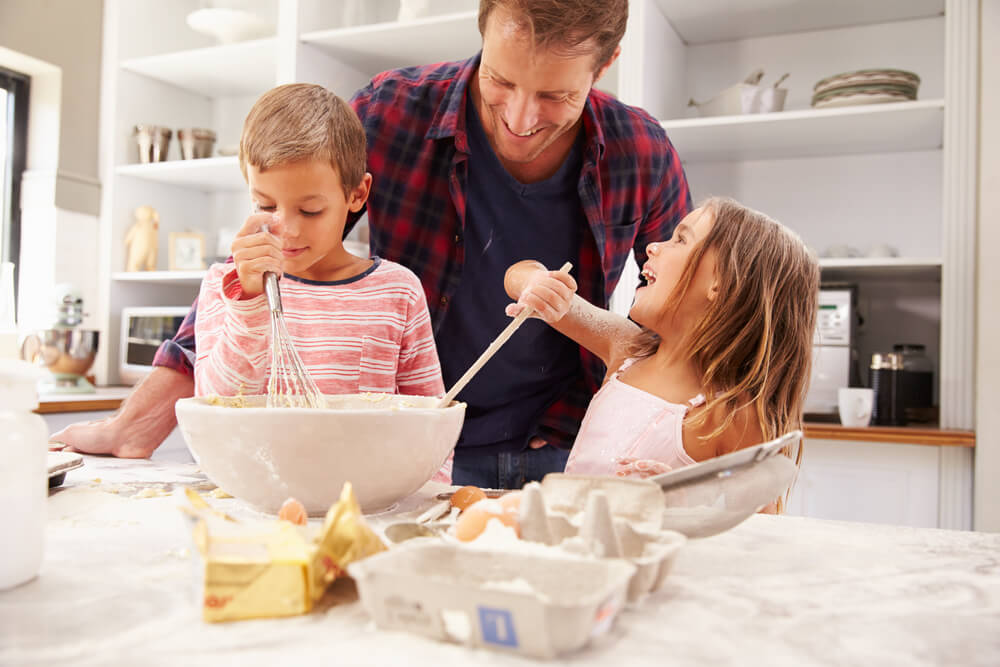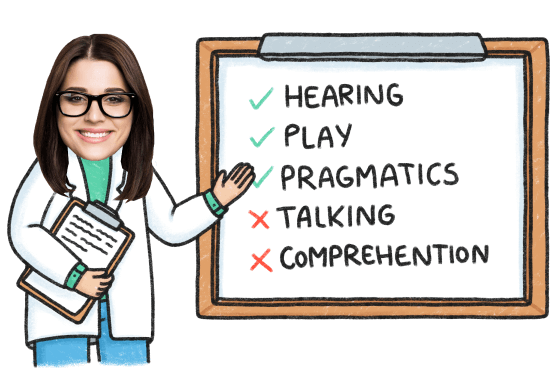Developing Language Understanding at Home
Feb 14, 2022 If you are like me . . . you will be at home with your family for the foreseeable future.
Now, your little ones might not be at school or nursery, or your local speech therapy might not be available, but this doesn’t mean your child needs to miss out on language activities. As a therapist, I am constantly saying that language development is a daily, parent-led, home-placed task . . . and so the current school situation provides an opportunity to try something new to achieve language development milestones.
A little bit everyday goes a long way! So when you are looking for something productive to do with 10 minutes, check out some of the fun-filled, language-rich activities below.
None of the learning games or language activities below require anything fancy or expensive, and should use things you already have in your homes!
Hard to get them to do anything that doesn’t involve a screen? Don’t worry! Check out the Speech Blubs App to use screen time productively and positively to get that language going.
Boost Your Child’s Speech Development!
Improve language & communication skills with fun learning!

5 Activities to Do at Home to Boost Language Development
1. Treasure Hunt
Write 5-10 clues on a piece of paper that describe an object on/in which the next clue is hidden, and have a special prize like a snack or a star for them to find at the end. The adult reads the clue which requires the child to listen and understand the language. Use category names, color, adjectives, and function words to describe the objects that the clue is hidden near. I list a breakdown of the different difficulty levels of language development you can pitch the clues.
CLUES
Easy example – use single key words
- Clue 1: a yellow, fruit, that monkeys like (banana).
- 2: furniture, in the bedroom, where we sleep (bed).
- 3: clothing that we wear on our head (hat).
Medium examples – little sentences including positions
- Clue 1: I’m hidden under the clothing you wear on your feet to play football (trainers).
- 2: I’m hidden in a machine in the kitchen that washes our clothes (washing machine).
- 3: I’m hidden next to something with two taps, where we wash our hands (sink).
Advanced examples – full sentences
These can use more abstract clues to increase the level of problem-solving required.
- Clue 1: I’m hidden where it’s cold and good to be if you’re hungry (fridge).
- 2: I’m hidden behind something rectangle, bright, and turned on by a button (TV).
- 3: Find me under something that is black and white, that has pedals, and makes a nice sound (piano).
2. Acting Out Stories
Pick any of your children’s favorite books and have a go at acting them out. The adult can read the story, and the children listen and act out the story as they hear and understand the language. Pick the book depending on the language level and the child’s interest. You could even film the acting out and then watch it back as a family. For a more advanced activity, teach them about the elements of a story.
3. Cooking
Get them in the kitchen! Recipes have really useful language and include new vocabulary, so they work wonders for language development. Before you start, pick out the keywords from the recipe and chat about it with your children like ‘half,’ ‘whisk,’ or ‘weigh.’ It doesn’t need to be baking, you could try making jam on toast, whizzing up a smoothie, or even homemade play-doh!

Either choose a recipe that matches your child’s skill/language level or rewrite out the recipe using more simple language. Read out the instructions for your child to listen to and follow. You can also support them to read it themselves. Add little pictures to create more visual instructions.
An example of a self-written recipe:
- Get two slices of bread
- Toast in the toaster until golden brown
- Get out the toaster carefully
- Spread on butter with knife
- Spread on jam with knife
- Cut in half and eat
There are different levels of vocabulary you can explore through cooking:
Easy vocabulary examples
- Nouns: flour, butter, egg, ham, etc.
- Verbs: cut, mix, cook, etc.
- Adjectives: hot, cold, hard, soft
Medium vocabulary examples
- Nouns: grater, tin opener, rolling pin, etc.
- Verbs: peel, grate, stir, boil, etc.
- Adjectives: crunchy, sweet, spicy, crumbly, etc.
Advanced vocabulary examples
- Nouns: sieve, hob, spatula, blender, etc.
- Verbs: sieve, bake, grill, blend, etc.
- Adjectives: smooth, thick, sour, chewy, juices, etc.
4. Workout
Using numbers, exercise, directional language, concepts, and equipment, practice the following workout instructions with your child. This is especially useful for children who love to be active and outside. Spoken instructions and showing them how to do certain tasks is really helpful. This could be done as a whole family activity.
Examples of workout instructions
- 5 star jumps!
- 10 quick hops!
- Balance the beanbag on your head for 10 seconds.
- 4 side steps to your right.
- Skip!
- Slow squats!
5. Family Question Quiz
Help your child understand questions. To prepare the activity write down a series of questions on different bits of paper and put them in a container. During family time/meal time/before bed . . . all pick a question from the pot and answer it. You child can practice listening to questions and learning how to answer.
Listening to the whole family do the task also creates a great opportunity for language modeling. Try and cover the main basic question words “who,” “what,” “where,” “when,” “how,” and “why.” For children under 5 years, focus on the first four before moving on to “how” and “why.”
Examples of questions for family quiz
- What is your favorite animal?
- Where would be your dream holiday?
- How do you feel today?
- Who is the best superhero?
- Where is your favorite place to eat out?
- If you had to bury treasure, where would you hide it?
- What is the best and worst thing about having no school!
- Why is it important for us to recycle?
Starting with these activities will go a long way toward meeting toddler milestones. The wonderful thing is they can be repeated or introduced in different stages of language development. Don’t forget young children learn faster when they have fun!
Have a question for our Speech Therapists?

